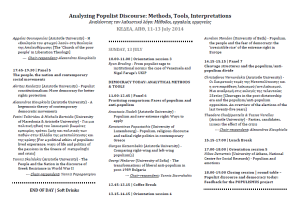‘Common sense’ is usually believed to be just that: common sense. I have it, you have it, everyone has it. Or more precisely, only those we disagree with, and therefore many of our politicians, seem to lack it. It’s just the way things should be, or how they used to be ‘back in the good old days’. Defining common sense, however, is not that simple. Most of us will claim unconvincingly that everyone knows what it is; that it is something so obvious that it does not need to be defined. If pushed, many would probably say that it is merely the natural or logical state of things, the answer we all know deep down is true. But do we really? Is one’s common sense the same as one’s neighbours’, countrymen’s and women’s or political opponents’? Is one’s common sense born out of nature, logic, or any other objective force; does it reflect our own prejudices and deep-seated beliefs; or is it created, theorised and imposed by various groups over others? In academic circles, the concept of common sense is often linked to that of hegemony, or as Peter Thomas defined it, ‘a strategy aiming at the production of consent, as opposed to coercion’. For Thomas, drawing on the works of Italian Marxist Antonio Gramsci, ‘hegemony involves a leading social group securing the (active or passive) consent of other social strata rather than unilaterally imposing its decrees upon unwilling “subjects”’. It is akin to what Rancière and others have called the politics of consensus: common sense is created when a group in society imposes its vision as one that cannot be challenged.
In Australia, as elsewhere, ‘common sense’ has become an essential political prize in the liberal democratic struggle. Our politicians are often accused, or accuse each other, of acting ‘non-sensically’, of misunderstanding the people’s general will, of being ‘out of touch’. Alternatively, politicians often claim to represent the ‘practical’ or ‘sensible’ viewpoints of the majority and give weight to such claims through the use of colloquialisms. Tony Abbott, for example, used the term ‘fair dinkum’ eight times in a memorable debate against Julia Gillard in 2010, and more recently declared, against evidence, that ‘the vast majority of asylum seekers who arrive by boat are not fair dinkum refugees’. Another favourite among politicians is a ‘fair go’. Yet what is a ‘fair go’? Can we assume that the most left-wing Labor supporter will agree with an ardent Liberal’s conception? That a Queenslander’s definition will be the same as that of a Victorian? That a farmer’s will resemble that of a pundit? That an asylum seeker will be on the same wavelength as a One Nation supporter?
From:
Mondon, A. (2013) ‘Fair dinkum politics or the death of politics’, in Tavan, G. (ed.) State of the Nation: Essays for Robert Manne. Melbourne: Black Inc.



